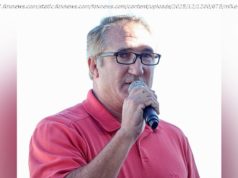President Trump and his legal team are doubling down on their assertion of nearly unconfined presidential powers when it comes to the Justice Department and…
President Trump and his legal team are doubling down on their assertion of nearly unconfined presidential powers when it comes to the Justice Department and special counsel Robert Mueller ’s probe into the 2016 presidential election.
Critics, both in politics and the media, have accused Trump and his team of asserting a Nixonian defense that in essence posits that the president is above the law. They argue the Trump team’s approach could trigger a constitutional crisis, if the president follows through on the war of words.
The president’s defenders deride that suggestion, with Rudy Giuliani, speaking to The Hill from Jerusalem, insisting it is those who assert that the president can be indicted or subpoenaed who are undermining legal norms.
“It’s the president who has immunity, and if you don’t give it to him, you are not obeying the rule of law,” he said. Giuliani, the former mayor of New York City, joined Trump’s legal team in April.
Asked about forceful criticism of Trump and his legal team from media figures such as Joe Scarborough of MSNBC, Giuliani shot back: “Maybe Joe Scarborough should get a law degree first before he expresses an opinion. He is so prejudiced against the president, it’s unbelievable.”
Scarborough, in fact, has a law degree from the University of Florida and practiced law in Florida before beginning his political career.
On Monday’s “Morning Joe,” Scarborough said the Trump team, if they pushed their case before the courts, “will be slapped down every bit as much as Richard Nixon. The Supreme Court does not believe that anybody is above the law.”
To The Hill, Giuliani acknowledged that a sitting president could legitimately be investigated but said that he could not be subpoenaed. He added that, internationally, “heads of state have that kind of immunity from being indicted and from being subpoenaed.”
Trump in recent weeks has repeatedly blasted Mueller’s team, former FBI Director James Comey and his own pick to run the Justice Department, Attorney General Jeff Sessions .
But Giuliani insisted that the president’s personal inclination was still to do an interview with the special counsel’s team — against the advice of his own lawyers.
“He still wants to do it — absolutely,” Giuliani insisted. “Even though everybody around him says don’t do it.”
Asked if Trump had expressed that view to him directly, the former mayor responded, “Yes — he says, ‘I am telling the truth, why should I not testify?’ ”
Those kinds of statements are sure to be met with enormous skepticism in other quarters, where Trump’s frequent verbal assaults on the Russia investigation as a “witch hunt” — a term he used twice on Monday alone — are seen as preparing the ground for a refusal to testify.
The New York Times on Saturday published a letter written by Trump lawyers John Dowd (who has since left the president’s legal team) and Jay Sekulow and hand-delivered to Mueller in January.
In it, the Trump team argued that the firing of Comey could not have constituted obstruction of justice; that the cooperation already provided in terms of documents and other witnesses means that Mueller has no real need to interview Trump; and that the president can end any Justice Department investigation for any reason.
Democrats responded with fury.
“The President’s legal arguments would render whole sections of the Constitution moot, and allow a president to engage in any form of criminality,” Rep. Adam Schiff (D-Calif.), the ranking member of the House Intelligence Committee, tweeted.
Legal experts who spoke to The Hill were scarcely less scathing of the president’s legal arguments.
Sol Wisenberg, a Washington attorney who worked as part of independent counsel Kenneth Starr’s investigation into President Clinton — and personally questioned the president — drew a distinction between Trump’s assertion of pardoning powers and the broader assertion that it was essentially impossible for a president to commit obstruction of justice.
Wisenberg said that although he had never heard a president claim such self-pardoning powers, it was an “open question” since the courts had never ruled on it.
By contrast, “the idea that he cannot obstruct justice, because he would somehow be obstructing himself, is ludicrous.”
Wisenberg contended that there was not — yet — a constitutional crisis. But he did not disparage those who expressed more general concerns about the president’s conduct.
“There is an absolute right to be concerned about Trump,” he said. “He has shown himself in many ways to be brash and thuggish.”
The reaction of Republican lawmakers is being watched keenly.
Senate Judiciary Committee Chairman Chuck Grassley (R-Iowa) said on Monday that if the president’s lawyers were advising him that he could pardon himself, “I think I would hire a new lawyer.”
But others have been much more muted. Senate Republican Whip John Cornyn (Texas) told reporters on Monday that the question of whether the president could pardon himself was “academic” and “a distraction.”
Senate Republicans who have been critical of Trump in the past have been slow to take him on directly in the latest controversy. They may, in part, be mindful of recent polling that has shown some erosion in the number of Americans who see the Mueller probe as justified.
That doesn’t impress anti-Trump Republicans, such as veteran Florida GOP operative Mac Stipanovich, who told The Hill that he thought congressional Republicans “may well be tested here.”
Stipanovich was among those who drew companions between Trump and the one president to resign from office.
“I think when he gets up in the morning, the man peering over Donald Trump’s shoulder into the mirror is Richard Nixon.”
Harry Litman, who served as a deputy assistant attorney general during the Clinton administration, went one further, arguing that even Nixon was not so inclined to deride the legal system itself.
Accusing Trump of “absolute contempt for the rule of law,” Litman added, “I think it’s far more pernicious.






